The human body has more bacterial cells that human cells and a large part of these live in the digestive system. New research is constantly showing the relationship of gut bacteria to many aspects of health. Unfortunately, the modern diet is largely deficient in foods that nourish this gut bacteria in a healthy way since many foods are pasteurized, irradiated or created in a sterile lab.
The balance of bacteria in the gut is important for immune health, hormone balance and many other aspects of wellness. Many of the foods that are most often consumed these days are high in sugar, processed grains, vegetable oils and foods that often let the “bad” bacteria grow more than they should.
Adding probiotic-rich foods and drinks to the diet is an easy way to give gut bacteria a boost and to keep the digestive system in proper balance. Here are five easy ways to consume more probiotics:
1. Make Some Kraut
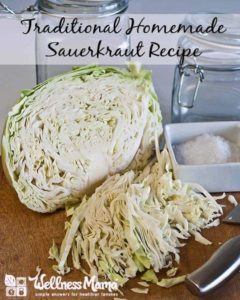 Think you don’t like sauerkraut? You probably have just never had a traditionally made sauerkraut. Unlike canned and store-bought options, traditional sauerkraut is crispy, salty and delicious.
Think you don’t like sauerkraut? You probably have just never had a traditionally made sauerkraut. Unlike canned and store-bought options, traditional sauerkraut is crispy, salty and delicious.
You can make it on your kitchen counter for the cost of some cabbage and it is a great way to add vegetables and probiotics to your diet. Almost any vegetable can be fermented and books like Wild Fermentation and Nourishing Traditions have a lot of great recipes.
Click here to see my recipe for delicious homemade sauerkraut.
2. Or Some Kvass…
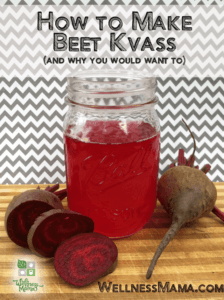 Like sauerkraut, Kvass is a naturally fermented and probiotic-rich drink with other health-boosting properties. Nourishing Traditions explains that it is:
Like sauerkraut, Kvass is a naturally fermented and probiotic-rich drink with other health-boosting properties. Nourishing Traditions explains that it is:
“valuable for its medicinal qualities and as a digestive aid. Beets are loaded with nutrients. One glass morning and night is an excellent blood tonic, promotes regularity, aids digestion, alkalizes the blood, cleanses the liver and is a good treatment for kidney stones and other ailments.”
We drink Kvass and use it in salad dressings. I sometimes mix Kvass with slightly cooled broth for a warm drink.
Here is the recipe for Beet Kvass.
3. Water Kefir “Soda”
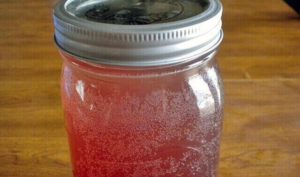 The kids’ favorite way to consume probiotics is in the form of Water Kefir “Soda.” Water Kefir is made by using a natural colony of beneficial yeast and bacteria to ferment a sugar water solution.
The kids’ favorite way to consume probiotics is in the form of Water Kefir “Soda.” Water Kefir is made by using a natural colony of beneficial yeast and bacteria to ferment a sugar water solution.
The bacteria consumes the sugar in the water and in the process creates probiotics and enzymes. If a secondary fermentation is done, the result is a naturally fizzy fermented probiotic drink that is reminiscent of a fruit soda. There are endless ways to customize water kefir soda flavors.
Water Kefir is dairy free and easy to make on the kitchen counter. Click here for my full tutorial.
4. Kombucha
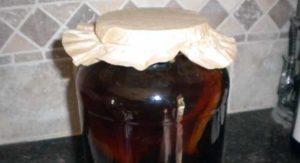 Kombucha has gained a lot of popularity lately and many stores now carry pre-bottled kombucha drinks. Kombucha contains a host of enzymes and probiotics and has a naturally tangy and fizzy taste. While I love store-bought versions, I’m not a fan of the $5/bottle price tag.
Kombucha has gained a lot of popularity lately and many stores now carry pre-bottled kombucha drinks. Kombucha contains a host of enzymes and probiotics and has a naturally tangy and fizzy taste. While I love store-bought versions, I’m not a fan of the $5/bottle price tag.
Kombucha is very simple to make at home and once you purchase a SCOBY (Symbiotic Colony of Bacteria and Yeast) the cost per gallon is less than $2. This is another thing that is often sitting on our counter. I actually brew two different ways:
- Continuous brew in a large glass jar with a spigot
- Traditional brew in gallon glass jars
We always do a secondary ferment with some organic juice to get the natural carbonation and this homemade kombucha is definitely my favorite way to get probiotics. Click on the links above to see the recipes. I recommend finding someone local who can share a SCOBY if possible, or buying from Kombucha Kamp if you can’t find one near you.
5. Homemade Ginger Ale
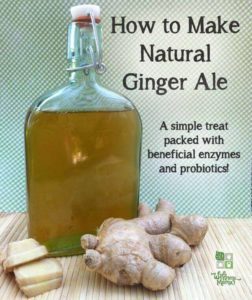 Another favorite at our house is homemade ginger ale. This recipe uses a ginger “bug” made from fresh ginger, natural sugars and wild bacteria to create a beneficial colony of bacteria that is then used to ferment a strong ginger tea.
Another favorite at our house is homemade ginger ale. This recipe uses a ginger “bug” made from fresh ginger, natural sugars and wild bacteria to create a beneficial colony of bacteria that is then used to ferment a strong ginger tea.
Unlike conventional soda which often contains high fructose corn syrup and artificial ingredients, this natural recipe combines the digestive benefits of fresh ginger with beneficial bacteria for a fizzy and refreshing “soda.”
If you haven’t already tried these fermented foods and drinks, I’d really encourage you to give them a try! Not only are they delicious, but full of health-boosting properties.
The suggestion to add probiotic rich fermented foods to my diet was one of the best pieces of health advice I’ve ever gotten. I HIGHLY recommend it!
What is the best food advice you’ve ever received? Ever fermented anything? Share below!
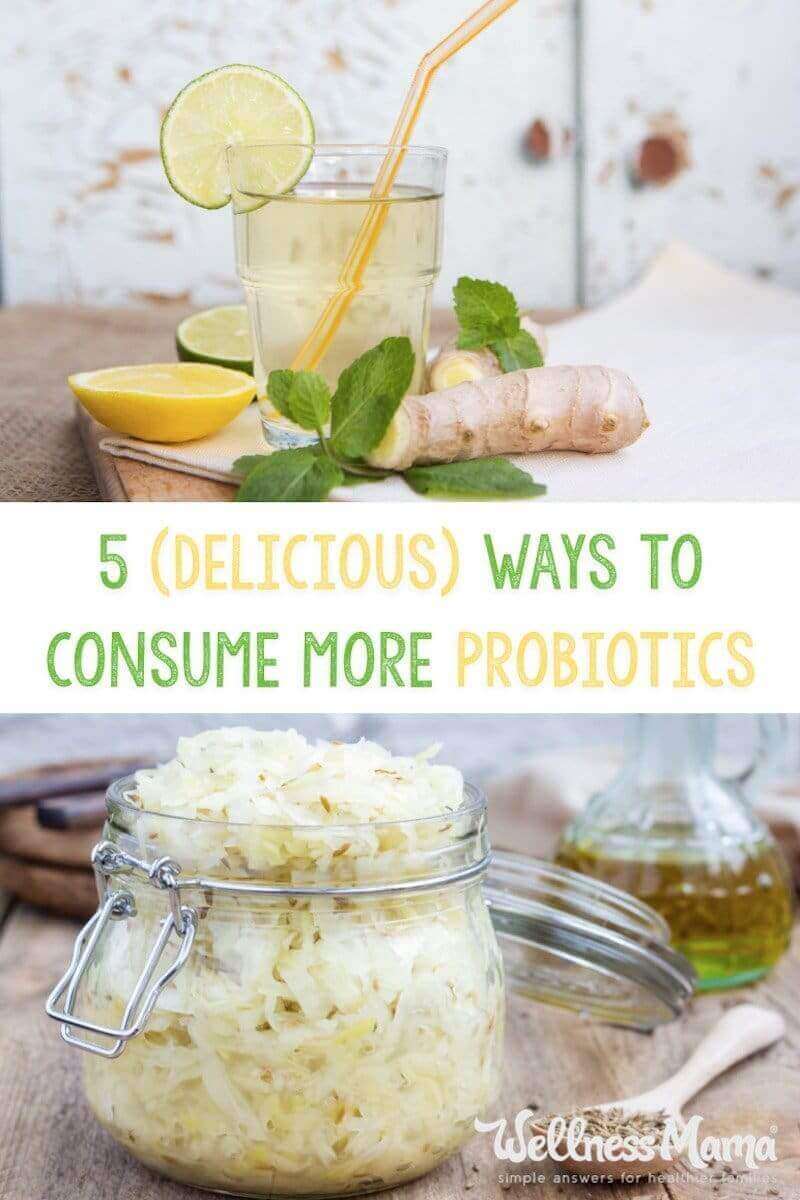

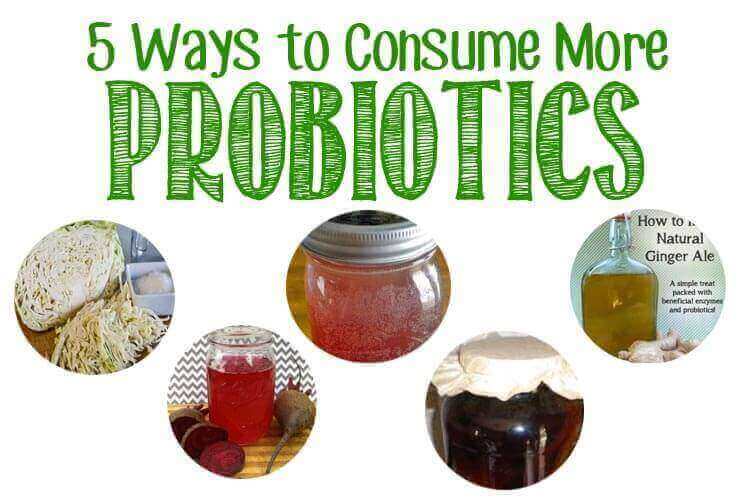
Leave a Reply